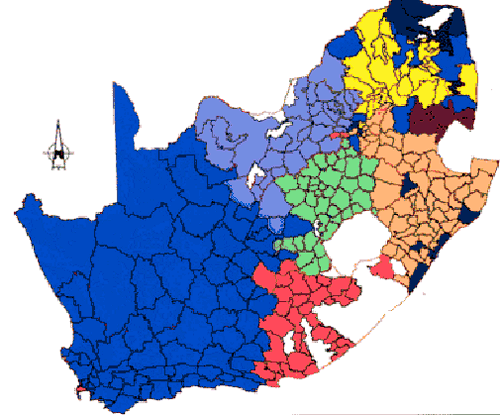
A Backgrounder to Afrikaans
Afrikaans is a relatively young language, yet it is very old. With its roots in Medieval Dutch, Afrikaans and modern Dutch are roughly equidistant from Old Franconian and similar medieval Rhine valley dialects. Afrikaans vocabulary remained closer to the medieval languages, but Afrikaans simplified the grammar immensely. German has three gender distinctions (DIE, DER, DAS), Dutch has two (HET, DE) and Afrikaans, like English, eliminated the gender distinction of nouns and uses (DIE). Afrikaans does not conjugate verbs.
Below is a map of where in South Africa Afrikaans is the dominant langauge.
So, what does it mean?
It means that in German and Dutch you have to cope with many more variables to construct the same meaning. Afrikaans uses essentially the same vocabulary, but reduces grammar variables. Afrikaans and Dutch share between 95% - 99% the same vocabulary. There are some consistent spelling differences between the languages. As an Afrikaans speaker, I can immediately understand Dutch, yet I have found, the Dutch need a few weeks to be up to speed with Afrikaans.
Thus, if you are a scholar of European languages, Afrikaans would be a superb entrance to the Germanic world.
But that is certainly not all. Afrikaans is obviously also an African language. If you have an interest in things African, this is an exciting venture into an exotic part of the world. Much historical and anthropological research is available in Afrikaans. It is an academic langauge, and should provide you with superb resources.
But, then there is the social aspect, the braaivleis (BBQ) African style, the humor, and access to the rich diversity of the peoples that speak the language.
Other resources about the language: Please see Language Links
(please report any dead links or suggest new ones -- click on the comments-feedback link below)
It means that in German and Dutch you have to cope with many more variables to construct the same meaning. Afrikaans uses essentially the same vocabulary, but reduces grammar variables. Afrikaans and Dutch share between 95% - 99% the same vocabulary. There are some consistent spelling differences between the languages. As an Afrikaans speaker, I can immediately understand Dutch, yet I have found, the Dutch need a few weeks to be up to speed with Afrikaans.
Thus, if you are a scholar of European languages, Afrikaans would be a superb entrance to the Germanic world.
But that is certainly not all. Afrikaans is obviously also an African language. If you have an interest in things African, this is an exciting venture into an exotic part of the world. Much historical and anthropological research is available in Afrikaans. It is an academic language, and should provide you with superb resources. But, then there is the social aspect, the braaivleis (BBQ) African style, the humor, and access to the rich diversity of the peoples that speak the language.
| Present Tense | Past Tense | Future Tense |
|---|---|---|
| [I] Ek is siek. Ek drink medisyne. | [I] Ek was siek. Ek het medisyne gedrink | [I] Ek sal siek wees. Ek sal medisyne drink. |
| [YOU] Jy is siek. Jy drink medisyne. | [YOU] Jy was siek. Jy het medisyne gedrink | [YOU] Jy sal siek wees. Jy sal medisyne drink. |
| [HE/SHE/IT] Hy/Sy is siek. Hy/Sy drink medisyne. | [HE/SHE/IT] Hy/Sy was siek. Hy/Sy het medisyne gedrink | [HE/SHE/IT] Hy/Sy sal siek wees. Hy/Sy sal medisyne drink. |
| [WE] Ons is siek. Ons drink medisyne. | [WE] Ons was siek. Ons het medisyne gedrink | [WE] Ons sal siek wees. Ons sal medisyne drink. |
| [YOU plural] Julle is siek. Julle drink medisyne. | [YOU plural] Julle was siek. Julle het medisyne gedrink | [YOU plural] Julle sal siek wees. Julle sal medisyne drink. |
| [THEY] Hulle is siek. Hulle drink medisyne. | [THEY] Hulle was siek. Hulle het medisyne gedrink | [THEY] Hulle sal siek wees. Hulle sal medisyne drink. |
| Afrikaans | = Dark Blue | Xhosa | = Red | Sesotho | = Light Green | ||||
| Zulu | = Orange | English | = Black | Seswati | = Brown | ||||
| SeTwana | = Light Purple | Northern Sotho | = Yellow |
A Backgrounder to Korean
Discussion to follow
Instructions will follow on doing the Korean characters.
